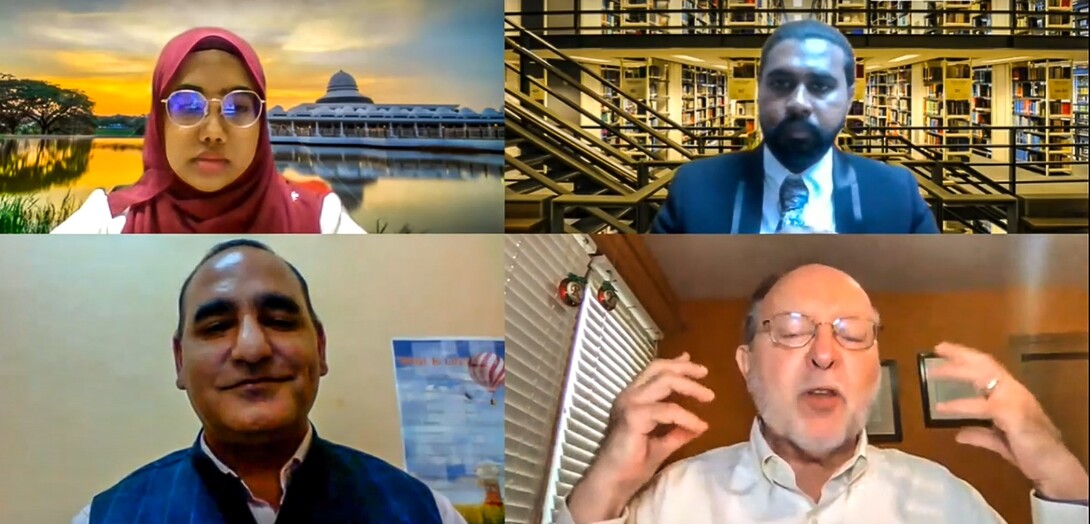
Studying abroad, organizing transnational research projects, hosting world-renown experts for campus seminars — the COVID-19 pandemic has interrupted many university activities on an international scale. Nevertheless, the University of Nebraska-Lincoln and its partners remain dedicated to global education and engagement.
In September, Nebraska was one of four institutions to host the Virtual International Seminar along with the University of Nizwa in Oman, Universiti Teknologi Petronas in Malaysia and the Federal University of Rio de Janeiro, Brazil. For this inaugural two-day seminar, the institutions set a goal of 500 attendees from around the world, yet more than 1,300 people joined from 24 different countries.
The theme of the seminar was “The Global Pandemic: Impact, Issues and Opportunities in 2020 and Beyond.” Drawing from expertise across campus, Nebraska hosted two sessions for the seminar following opening remarks from Josh Davis, associate vice chancellor for global affairs. Nebraska’s first session provided an overview of the challenges and opportunities resulting from COVID-19 in U.S. higher education, presented by the Office of Global Strategies and Cody Hollist, associate professor in the Department of Child, Youth and Family Studies. The second session, “Values of Virtual Classroom Exchanges: Effects of the Pandemic,” included a student panel led by Gary Kebbel, professor of journalism in the College of Journalism and Mass Communications.
“The general knowledge that the world is made up of insular parts isn’t logical — so much of what we do and what we have is from outside our country,” Kebbel said. “The world is too interconnected for us to ignore it; we need to be a part of those connections around the world.”
Like other seminar presenters, Kebbel noted in his session that the global pandemic is changing the way things are done, especially in the world of education and virtual exchange. Yet some things will never change, such as the university’s interests in global and the nature of being a global citizen instilled through ACE 9 courses and other campus activities.
In the past few years, Nebraska has continued to find new ways for students to enter the global conversation and to partner with institutions around the world to solve global challenges. The COVID-19 pandemic has renewed this dedication to global participation — including a new entrepreneurship-focused program that allowed Egyptian students to take online classes at Nebraska this summer, expanding virtual education abroad programs and continuing Nebraska’s Global Virtual Classrooms initiative.
Kebbel, who was an inaugural awardee of the Global Virtual Classrooms grant, used his “Global News” course last spring to highlight the benefits students gain from global exchange. Even when regular class was disbanded for two weeks at the start of the pandemic, students at Nebraska and the University of Nizwa voted to continue their meetings over Zoom.
During his presentation, Kebbel explained how at the start of the semester, his students were worried about unintentionally offending their international peers, so they were quite shy. But the students broke the ice by talking about their families and sharing photos. Through that experience, they realized the similarities each of them had, in Nebraska and Oman, and were comfortable enough to tell jokes with one another by the end of the semester.
Kebbel is a strong believer that small actions and new relationships can lead to big things, just as the students’ conversations started with everyday topics and grew into international friendships. When Kebbel was in Oman visiting the University of Nizwa a few years ago, he says they told him they wanted a bigger and expanded relationship with the University of Nebraska-Lincoln.
“They proved it by asking us to be in this conference,” Kebbel said. “I really think our exchange led to the formation of this seminar. We started with smaller relationships and built up from there.”
Kebbel also used the VIS 2020 seminar as an opportunity for his current journalism students to learn how to cover a worldwide virtual event.
“I stressed the importance of an event like this because so much of their reporting will be totally remote,” Kebbel said. “I really wanted my students to notice that all of the speakers were from across the globe.”
By attending a virtual conference such as this one, students saw how different countries approach issues that happen within the U.S. Many of the panel sessions focused on topics that have a worldwide impact, such as the oil and gas industry and finance.
“I asked my students to approach the conference as if I were sending them to city hall,” Kebbel said. “When they arrive, there’s issues they don’t fully understand. But through examining the speakers and listening to their accents, they’re able to use the speakers as a springboard for new stories and angles.”
Like other professors at Nebraska using technology to bring students new, innovative learning experiences, Kebbel believes that virtual exchanges – such as attending international conferences and building a global classroom – will continue to be important for universities even after the pandemic.
“Virtual exchange is beneficial for every student, no matter what career path they’re on,” Kebbel said in reflecting on his course and his seminar presentation. “I think deep down, students realize the potential of these kinds of meetings: they get to learn about a culture so different from their own.”







